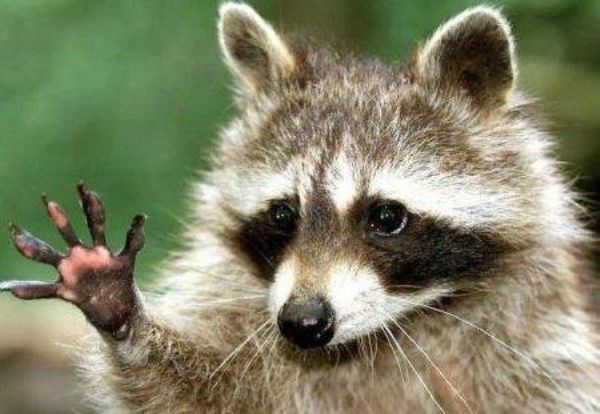
I always felt that raccoons got an unfair bad rap when it comes to ponds. Prior to any pond installation I always have a consultation with my customers and we talk about the “facts of life” when it comes to owning a pond. In that talk, concern over predators always comes up, and rightfully so. Predators can be a concern for any pond owner, especially when some people may spend a pretty penny on some fish that they do not want to see end up as a sushi lunch for some backyard predator or because most fish usually end up being regarded as family pets.
We then discuss what some of the pond predators are that occur in this particular area, the greatest predominant threat being the Great Blue Heron (which is another blog post all together); but the question of raccoons always comes up to. Although there are exceptions I really feel that the raccoon does not represent much of a threat to a properly built pond installation, but the raccoon has a bad reputation anyhow.
Here’s why I don’t think raccoons are much of a threat. Back in another life and time, I was a Park Ranger and among my duties was to be familiar with the common wildlife that people were likely to encounter in the park systems that I patrolled. Deer, coyote, fox, beaver, rabbit, black bear, chipmunks/squirrel, and raccoon were among some of the land critters I became well versed in and I had opportunity to observe and deal with raccoons often.
First of all, I like raccoons, ever since my “Ranger Rick” subscription as a kid they always held a regard from me, and they are amazing looking creatures with markings that any person would immediately commit to memory. They are very cute, somewhat shy animals, but let’s face it; raccoons are lazy!! If a raccoon has the option to work for a meal, like trying to catch a fish, or to get an easy meal, like knocking over a garbage can, they will always go for the easy money. The fact that they don’t want to work for food is my biggest reason they do not represent much of a threat to the typical fish pond.
But here are some other reasons. Raccoons are not diving or swimming animals, like otter or mink. The classic image of a raccoon working the shoreline of a stream or pond is exactly that…the shoreline, they never really want to get wet other than going for an opportunistic grab for a tasty crayfish or juicy frog that may be dwelling too close to shore. Water is not their habitat at all actually; the raccoon much prefers nesting in a tree. Also, raccoons where I live (New Jersey) have become well adapted to suburbia and have such an abundant food supply they really do not have to work for a live fish meal. The raccoon also will eat just about anything from insects to berries to road kill, going after your pondfish is simply wasted time for a raccoon.
This is not to say that it does not happen; it just doesn’t happen to a well constructed pond that often. If a raccoon does some damage it is usually occurring in the small and shallow “big box store” type of pond installation, these ponds are pretty much like setting up a sushi bar in your yard and the ease of capture is too great a temptation even for the “easy meal, no work” raccoon.
If a raccoon does hit your pond they leave some tell tale signs, the biggest being that the raccoon will eat at site, they do not take the fish to go. The raccoon will also leave behind, usually pondside, the head, tail, and backbone of the fish preferring to only eat the intestines of the fish (again the easy way to eat fish, no fish bones for theses guys)! Other predators take the entire fish with them. Raccoons may even leave behind footprints as their calling card if the gutted fish does not give it away.
So as far as predators, the concern is real, but don’t lose any sleep over raccoon worries; your bigger concern with raccoons is cleaning up the knocked over garbage can with your leftover chinese food boxes strewn around, licked clean, but strewn!
